Drills are probably the most used of any power tool, below you will find the best advice that I can give regarding drills. Firstly there are hundreds of different manufacturers of drills all with differing qualities and all different prices. You can pay as little as £9.99 for a drill or £500 or more!
When choosing a power drill it is essential you know exactly for what and how often it will be used, paying £9.99 for a drill and using it everyday to drill large holes in hard materials will mean several trips back to the supplier (when it breaks), you will probably find that the guarantee that comes with the drill specifies that if the drill is used for making holes that the guarantee is invalidated, I know of a friend who purchased a cheap SDS drill and used it for chiselling, when it broke he took it back as he had only had it for a week or so, The guy in the shop recommended that he should not use it for chiselling as it is not a very good drill for chiselling and should only be used for drilling holes!!! On the other hand you do not want to be paying £500 for a drill that you are only going to use once a year for putting shelves up. At the last count I had 8 drills, 5 of which are cordless.
Drill chucks
There are several different types of chuck which will vary greatly depending on how much you pay for your drill, the cheapest drills have metal chucks which require a key to open and close them, these chucks used to be very common but are now a little outdated and loosing the chuck key was one of the biggest problems. Keyless chucks are far better as long as it is a quality one. Cheap chucks tend to lose their grip and often the drill bit does not stay central and wonders when you are drilling, tightening one of these chucks can be very difficult and often requires a new chuck. More expensive Keyless chucks have magnesium jaws and are all metal construction.
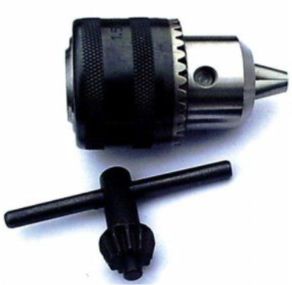
Keyed chuck
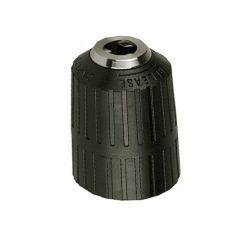
Keyless chuck
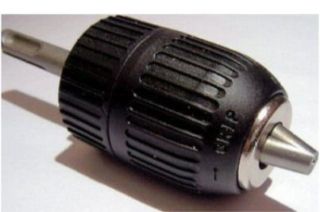
SDS converter chuck
SDS chucks accept special SDS type drill bits which do not require the drill bit to be tightened in the chuck, you simply push them in and then pull a collar back to release them! DO not think for one minute that a SDS machine is the same as a normal drill but with a different chuck as this Is like comparing a model t ford to a Ferrari.
Standard power drill
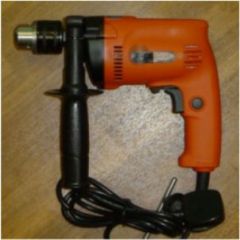
A drills performance is governed by the size of the motor, which is measured in the amount of electricity (watts) that it uses. The more electricity a drill uses the more powerful it will be! The drill above is a 400w drill with basically no additional features, this drill will drill wood, Plastic or metal but will not be suitable for Masonry.
Air drill
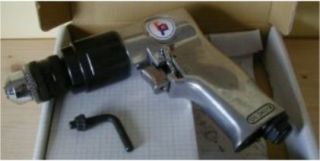
Another variation of this drill is the air powered drill which operates from compressed air, I have never seen an air drill yet with Hammer action as they are normally used in engineering or vehicle shops
Hammer drill
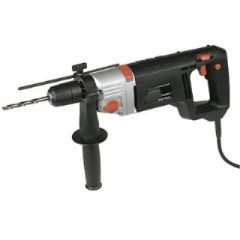
A variation of the standard power drill is the hammer action drill, these often come with either a keyed chuck or keyless chuck and often have variable speed and a reverse gear, which is handy for screw removal! There are different types of hammer drill which makes it very confusing, there are rotary hammers, Pneumatic hammers and percussion hammers. I have often asked in tool shops what the difference is but they never know the answer apart from Pneumatic hammers are the best and are found in SDS machines. A good quality hammer drill will suffice for most DIY tasks but will be useless for drilling large holes in concrete etc. I once had a Bosch hammer drill which lasted me 10 years, I had drilled numerous holes in brick with it but finally broke it when drilling concrete.
SDS Drill
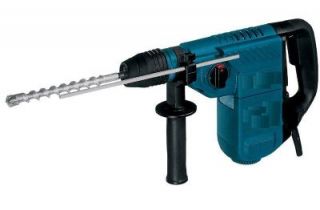
A good SDS drill will drill virtually anything, these drills vary in weight from 1kg to over 10 kgs. The more expensive versions also have rotary stop on them which means they can be used for chiselling plaster off walls and even demolition work. Look for one with a safety clutch if you are going to be drilling large holes in concrete as one of these machines can cause considerable damage to the user if it jams and the trigger is not released in time! A safety clutch will ensure that although the motor on the machine is still turning the chuck will not as the clutch will slip at a specified torque.
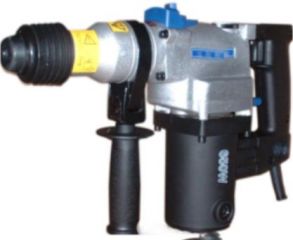
SDS machines start at about £45.00 but do not expect too much if paying this price!
Angle drill
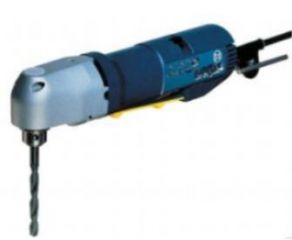
Angle drills are becoming very popular and are the favourite tool of electricians, plumbers and Kitchen fitters. These drills will fit in very confined spaces and make drilling holes in Joists for feeding electrical cables or pipes very easy. Some have variable speed and so can be used to fix screws, these are particularly useful for fitting slim line kitchen units together etc.
Bench drill
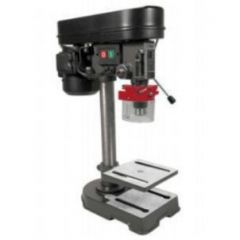
Bench drills are normally only used in workshops or garages and are either floor standing or bolted to a bench. These often have different speeds which is adjusted by moving a belt on the top across different sized pulleys. These are very useful for drilling accurate holes such as the holes for concealed kitchen cupboard hinges. Bench drills also normally have a depth stop on which makes drilling the correct depth easy. On expensive models the table can be tilted or raised and lowered, making it easy to drill large objects. If you do a lot of woodwork make sue a mortice attachment can be fitted as some models will not suit a mortice attachment.



